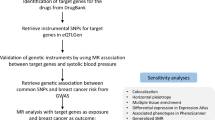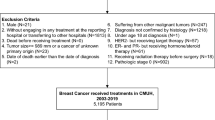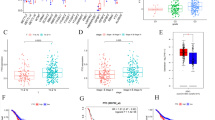Abstract
Hypoxia-inducible factor 1α (HIF-1α) is an important transcription factor that regulates different cellular responses to hypoxia. HIF-1α is rapidly degraded by von Hippel–Lindau (VHL) protein under normoxic conditions and stabilized under hypoxia. A common variant of HIF-1α (1772C>T) (rs 11549465) polymorphism, corresponding to an amino acid change from proline to serine at 582 position within the oxygen-dependent degradation domain, results in increased stability of the protein and altered transactivation of its target genes. The present study was aimed to find the association between HIF-1α (1772C>T) (rs 11549465) polymorphism and breast cancer development. For this purpose, 348 primary breast cancer patients and 320 healthy and age-matched controls were genotyped through PCR-RFLP method. The genotype frequencies were compared between patients and controls, and their influence on clinical characteristics of breast cancer patients was analyzed. Our study revealed a significant increase of TT genotype in breast cancer patients compared to controls (p = 0.038). Further, TT genotype and T allele were found to be associated with progesterone receptor (PR)-negative status (p < 0.09). None of the clinical variables revealed significant association with HIF-1α (1772C>T) (rs 11549465) polymorphism.

Similar content being viewed by others
References
Gaurav A, Pooja R, Ernesto R, Sanchez F, Jorge Carrasco R, Juan Manuel C, et al. Breast cancer care in developing countries. World J Surg. 2009;33:2069–76.
Anderson BO, Yip CH, Ramsey S, et al. Breast cancer in limited-resource countries: health care systems and public policy. Breast J. 2006;12(1):S54–69.
Agarwal G, Ramakant P. Breast cancer care in India: the current scenario and the challenges for the future. Breast Care. 2008;3:21–7.
Amankwah E, Lin HY, Sellers T, Park H, Radlein S, et al. Genetic variations in angiogenesis-related genes in prostate cancer recurrence. Cancer Res. 2012;2615–72.
Powsi G, Kirkpatrick L. Hypoxia inducible factor-1α as a cancer drug target. Mol Cancer Ther. 2004;3:647–54.
Forsythe JA, Jiang BH, Iyer NV, Agani F, Leung SW, et al. Activation of vascular endothelial growth factor gene transcription by hypoxia-inducible factor. Mol Cell Biol. 1996;16:4604–13.
Semenza GL. HIF-1 and human disease: one highly involved factor. Genes Dev. 2000;14:1983–91.
Semenza GL. Targeting HIF-1 for cancer therapy. Nat Rev Cancer. 2003;3:721–32.
Kaelin WG. Molecular basis of the VHL hereditary cancer syndrome. Nat Rev Cancer. 2002;2:673–82.
Sakamoto M, Hirohashi S, Shimosato Y. Early stages of multistep hepatocarcinogenesis: adenomatous hyperplasia and early hepatocellular carcinoma. Hum Pathol. 1999;22:172–8.
Kim OH, Jo HY, Lee J, Lee SS, Yoon SK. The C1772T genetic polymorphism in human HIF-1α gene associates with expression of HIF-1α protein in breast cancer. Oncol Rep. 2008;20:1181–7.
Ollerenshaw M, Page T, Hammonds J, Demaine A. Polymorphisms in the hypoxia inducible factor-1alpha gene (HIF-1A) are associated with the renal cell carcinoma phenotype. Cancer Genet Cytogenet. 2004;153:122–6.
Kuwai T, Kitadia Y, Tanak S, Kuroda T, Ochiumi T, et al. Single nucleotide polymorphism in the hypoxia-inducible factor-1alpha gene in colorectal carcinoma. Oncol Rep. 2004;12:1033–7.
Chau CH, Permenter MG, Steiberg SM, Retter AS, Dahut WL, et al. Polymorphism in the Hypoxia-inducible factor-1alpha gene may confer susceptibily to androgen- independent prostate cancer. Cancer Biol Ther. 2005;12:1222–5.
Fransen K, Fenech M, Fredrikson M, Dabrosin C, Soderkvist P. Association between ulcerative growth and hypoxia-inducible factor-1alpha polymorphisms in colorectal cancer patients. Mol Carcinog. 2006;45:833–40.
Ling TS, Shi RH, Zhang GX, Zhu H, Yu LZ, Ding XF. Common single nucleotide polymorphism in the hypoxia-inducible factor-1alpha and its impact on the clinicopathological features of esophageal squamous cell carcinoma. Chin J Dig Dis. 2005;6:155–8.
Tanimoto K, Yoshiga K, Eguchi H, Kaneyasu M, Ukon K, et al. Hypoxia-inducible factor-1alpha polymorphisms associated with enhanced transactivation capacity, implying clinical significance. Carcinoma. 2003;24:1779–83.
Clifford SC, Astuti D, Hoffer L, Maxwell PH, Ratcliffe PJ, Maher ER. The pVHL associated SCF ubiquitin ligase complex: molecular genetic analysis of elongin B and C Rbxl and HIF-1 alpha in renal cell carcinoma. Oncogene. 2001;20:5067–74.
Lahiri DK, Nurnberger Jr JI. A rapid non-enzymatic method for the preparation of HMW DNA from blood for RFLP studies. Nucleic Acids Res. 1991;19(19):5444.
Alidoosti M, Ghaedi M, Soleimani A, Bakhtiyari S, Rezvanfard M, et al. Study on the role of environmental parameters and HIF-1A gene polymorphism in coronary collateral formation among patients with ischemic heart disease. Clin Biochem. 2011;44:1421–4.
Moriya T, Sonoo H. Hypoxia reduces hormone responsiveness of human breast cancer cells. Jpn J Cancer Res. 2001;92:1093–101.
Acknowledgments
We would like to thank Nizam’s Institute of Medical Sciences, Hyderabad, for providing samples from the breast cancer patients.
Conflicts of interest
None
Funding
This study was funded by University Grants Commission-Centre for Advanced Studies (UGC-CAS-II), New Delhi and DBT-OU-ISLARE. PM is thankful to UGC-CAS-II for providing fellowship.
Author information
Authors and Affiliations
Corresponding author
Rights and permissions
About this article
Cite this article
bhushann Meka, P., Cingeetham, A., Nanchari, S.R. et al. HIF-1α (1772C>T) polymorphism as marker for breast cancer development. Tumor Biol. 36, 3215–3220 (2015). https://doi.org/10.1007/s13277-014-2949-y
Received:
Accepted:
Published:
Issue Date:
DOI: https://doi.org/10.1007/s13277-014-2949-y




